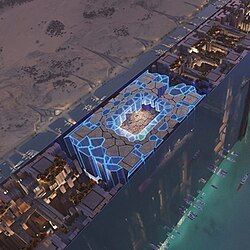NEOM Stadium
 Planned design of stadium | |
 | |
| Location | The Line, Neom, Saudi Arabia |
|---|---|
| Coordinates | 28°06′59″N 35°06′14″E / 28.116443°N 35.103960°E |
| Elevation | 350m above ground |
| Owner | NEOM Company |
| Operator | NEOM Company |
| Capacity | 46,096 |
| Field size | Field of play: 105m × 68m Pitch area: 125m × 85m |
| Surface | Hybrid grass |
| Construction | |
| Broke ground | 2027 (planned) |
| Opened | 2032 (planned) |
| Architect | Bjarke Ingels Group |
| Main contractors | Webuild |
| Tenants | |
| Neom SC & Neom SC (women) (planned) | |
NEOM Stadium (Arabic: ملعب نيوم, romanized: maleab nium) is a planned multi-purpose stadium located in The Line, Neom, Saudi Arabia.[1] It is set to be a venue for the 2034 FIFA World Cup and has a proposed capacity of 46,010 people, where it will host fixtures in the group stage, round of 32, round of 16, and quarterfinals.[1]
Description
[edit]Construction
[edit]Construction on the stadium will begin in 2027 and its opening will take place in 2032.[1]
NEOM Stadium will redefine global stadium design with its unparalleled features. Positioned over 350 meters above ground, the stadium offers breathtaking views and incorporates a roof seamlessly integrated into the city itself, creating a one-of-a-kind experience. Equipped with cutting-edge technology such as e-ticket gates and 4K Ultra HD broadcasting, it promises to deliver a world-class experience for players, spectators, and broadcasters alike.[1][2]
Located at the center of a new sports-focused neighborhood, the stadium will be adjacent to the Health and Well-Being District and the University, ensuring seamless accessibility from multiple levels within THE LINE. Powered entirely by renewable energy sourced primarily from wind and solar, the stadium aligns with NEOM’s commitment to sustainability. Its fully electric transportation system and the five-minute walkability model will further enhance eco-friendly, foot-based travel, making it a true landmark of innovation and sustainability.[3][2]
The Line
[edit]The Line is a revolutionary urban development within NEOM in Saudi Arabia, designed as a linear city stretching 170 kilometers (105 miles) across the desert. Unlike traditional cities, it is just 200 meters wide, extends vertically to multiple levels, and is planned to house up to 9 million residents.[4]
The Line is designed to operate entirely on renewable energy, with no cars or roads, promoting sustainability and walkability. High-speed transit systems ensure that all amenities are accessible within a five-minute walk or a 20-minute journey. The project emphasizes harmony with nature, leaving 95% of the surrounding environment untouched, while integrating advanced technologies for an eco-friendly and efficient lifestyle. It is a key part of Saudi Arabia’s Vision 2030 initiative.[5]
Post-2034
[edit]Before and after the World Cup, the stadium will serve as a signature landmark within The Line, embodying the heart of its sporting and active lifestyle initiatives. It will be home to both a men’s and women’s professional football club, offering a world-class base for the teams, their fans, and community programs. Additionally, the stadium will be a versatile venue, capable of hosting other major events, further solidifying its role as an iconic hub for sports and entertainment.[1]
See also
[edit]References
[edit]- ^ a b c d e "Growing. Together. The Saudi Arabia FIFA World Cup™ 2034 Bid" (PDF).
- ^ a b "Saudi Arabia unveils World Cup 2034 stadium on The Line at Neom". Dezeen. 2024-08-01. Retrieved 2025-01-02.
- ^ "Saudi Arabia FIFA World Cup 2034™". saudi2034bid.com. Retrieved 2025-01-02.
- ^ correspondent, Martin Chulov Middle East (2022-07-27). "Saudi Arabia plans 100-mile-long mirrored skyscraper megacity". The Guardian. ISSN 0261-3077. Retrieved 2025-01-02.
{{cite news}}:|last=has generic name (help) - ^ "Saudi Arabia is planning a 100-mile line of car-free smart communities". Engadget. 2021-01-11. Retrieved 2025-01-02.
